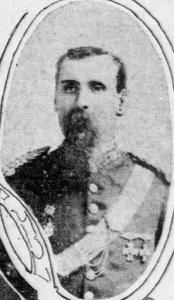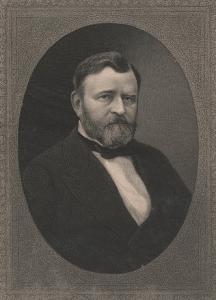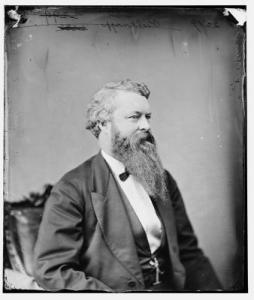The Way of War
If Governor William Woods Holden was going to win a war against the Ku Klux Klan, he was going to need allies who knew how to fight. One of the first men he recruited was a former Union bushwhacker named George W. Kirk. Kirk was a well-known guerilla fighter who led raids into Western North Carolina during the Civil War. He and his troops—known informally as Kirk's Raiders—sabotaged Confederate railways and attacked unsuspecting Confederate units with reckless abandon.
This rough and tough attitude appealed to Governor Holden, who picked Kirk to command the militia and gave him the rank of Colonel. Colonel Kirk organized his forces and targeted areas of high Klan activity to enforce Governor Holden's martial law. Moving from county to county, Colonel Kirk and his second in command Colonel George B. Bergen arrested local Klan leaders and restored order. Despite the gains, Governor Holden's effort required more support, prompting him to reach out to an important potential ally for help.
Portrait of George W. Kirk, circa 1901. Courtesy of The San Francisco Call
Portrait of President Ulysses S. Grant. Courtesy of the Library of Congress
On July 20, 1870, Governor Holden wrote President Ulysses S. Grant requesting additional support, mainly in the form of Federal soldiers. Governor Holden supported his request with three important points: the militia was largely outnumbered, the deployment of African American militia would likely lead to increased violence, and that it was impossible to find enough white men who supported his cause.
Governor Holden also argued that the presence of Federal soldiers in North Carolina would be enough to deter members of the Klan. President Grant agreed. In a letter dated July 22, he assured Governor Holden he had his support and directed Secretary of War William Worth Belknap to deploy Federal troops to North Carolina.
The use of troops to suppress Klan activities in North Carolina was very effective. Colonel Kirk and his militia forces arrested around 100 members of the Klan and successfully broke up Klan activity in both Caswell and Alamance Counties. Despite their success in restoring law and order, the soldiers' presence wasn't entirely welcomed. Opposition to Governor Holden's use of troops led many Conservative newspapers to relentlessy attack the anti-Klan campaign, their columns often exaggerating or outright fabricating alleged outrages and mistreatment by Holden's forces. Governor Holden's campaign to arrest Klan members was a success, to be sure, but on the frontlines of the battle in the media, he met a formidable foe: Josiah Turner, Jr.
Portrait of U.S. Secretary of War William W. Belknap. Courtesy of the Library of Congress



